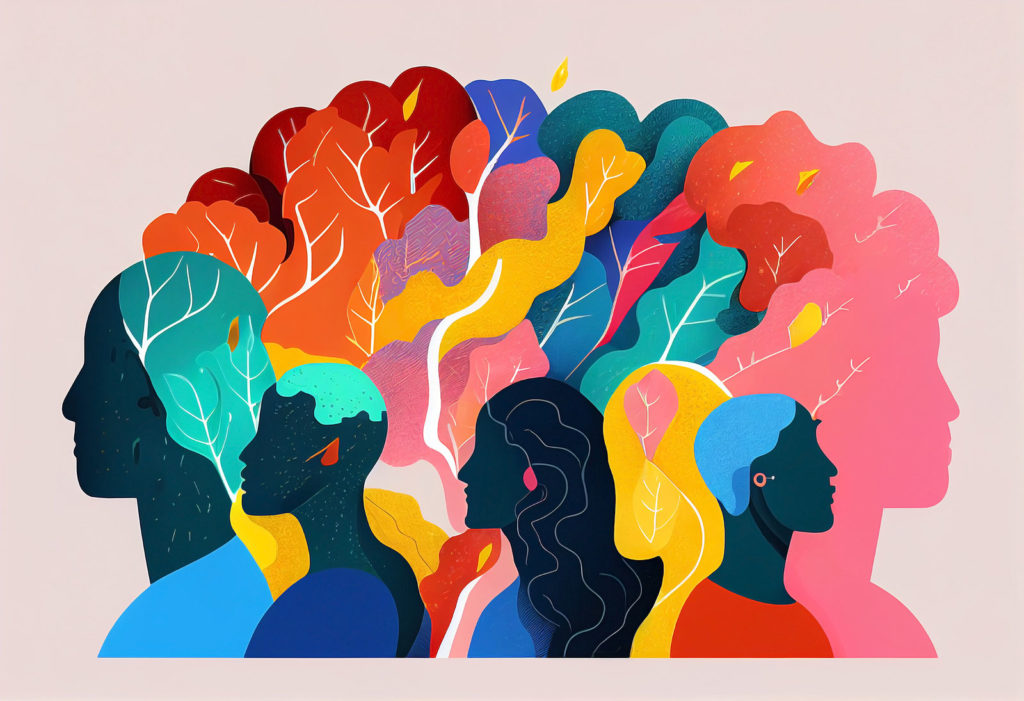The brain can function in many complex and unique ways, some of which are atypical. For example, a person who is neurodivergent might have issues with executive function, which is a set of skills that includes self-control, solving problems, and making plans.
Neurodivergence is tied to the neurodiversity term, which describes differences in cognitive skills between people. Neurodiversity applies to differences in learning, behavior, and thinking. It’s an umbrella term that challenges the traditional neurotypical model by expanding it.
If someone is neurotypical, it means that they process information in a manner that’s traditional. Most brain functions develop at rates that are similar to everyone else. A neurodivergent person is someone who processes information in a manner that’s not standard for people of the same age.

While conditions like ADHD (attention deficit hyperactivity disorder), OCD (obsessive-compulsive disorder), bipolar disorder, dyspraxia, tourette syndrome, dyscalculia (difficulty with math) and ASD (autism spectrum disorder) are examples of neurodivergence, this term isn’t a diagnosis. It’s mainly used to describe instances when someone’s brain works differently. However, being different doesn’t mean wrong.
Since neurodivergent traits can cause issues with executive function, the risk of addiction is higher. If you’re currently addicted to drugs or alcohol, it’s important to recognize signs of neurodivergence when seeking treatment.
Table of Contents
- Common Signs of Neurodivergence
- Neurodivergence and Co-Occurring Conditions
- The Link Between Neurodivergence and Substance Abuse
- Diagnosing Neurodivergence in Adults
- Treatment Options for Neurodivergent Individuals at Illinois Recovery Center
- Building a Support System for Neurodivergent People
- When to Seek Help
- Conclusion and Call to Action
Common Signs of Neurodivergence
While neurodivergence is used to describe many possible behaviors and conditions, there are some common signs that you should look for.
Cognitive Differences
You might have difficulty focusing and displaying executive function skills. These issues are common in ADHD. If you find it challenging to write, process information, and read, you might have dyslexia. The symptoms of autism include social communication challenges and sensory sensitivities.
Behavioral Indicators
There are also many behavioral indicators of neurodivergence, such as impulsivity and hyperactivity. You might also display repetitive behaviors or strict routines. Neurodivergent individuals regularly struggle with organization and time management.
Emotional and Social Signs
Neurodivergence also comes with several emotional and social signs. For example, you might experience heightened anxiety during social situations. If you tend to have strong interests or hyper fixate on specific topics, you may have neurodivergence. The same is true if you have difficulty with emotional regulation.
Neurodivergence and Co-Occurring Conditions
Neurodivergence often coexists with mental health orders, such as anxiety and depression. If you have been diagnosed with these mental health conditions, you’ll likely be at a higher risk of addiction. Individuals who are depressed or anxious often use drugs or drink alcohol as a coping mechanism. Since neurodivergence makes it challenging to regulate emotions, people commonly choose to self-medicate.

The Link Between Neurodivergence and Substance Abuse
There’s a strong but complex link between neurodivergence and substance abuse. Many neurodivergent people turn to substances for relief because of issues with sensory processing and executive function. For example, neurodivergent individuals experience smells and sounds differently than neurotypical ones.
The two types of sensory processing issues that neurodivergent people go through include hypersensitivity and hyposensitivity to stimuli. If you typically avoid busy or loud places, you might have hypersensitivity to sensory stimuli. This issue can lead to feelings of anxiety, which is why some people use substances for relief. Hyposensitivity involves being underwhelmed by most of the world around you. In this scenario, people might attempt to experience extra sensory stimuli in the form of drugs or alcohol.
If left untreated, neurodivergent individuals are more likely to become addicted to substances and develop mental health conditions. The presence of conditions like autism and ADHD makes it more challenging to regulate emotions and manage stress, which can lead to substance abuse. Neurodivergent individuals require specialized treatment that addresses addiction as well as any co-occurring mental health disorders.
Diagnosing Neurodivergence in Adults
Many neurodivergent traits are overlooked in childhood because they are subtle and difficult to detect. Parents might not readily notice them if they don’t lead to adverse health problems or serious issues with performing everyday tasks. Neurodivergent individuals are often diagnosed later in life. You may find yourself being diagnosed with a condition like dyslexia, ADHD, or autism when you’re an adult.
If you’ve struggled with specific tasks for years, it’s highly recommended that you obtain professional assessments and screenings to determine if you have neurodivergent characteristics. This knowledge might give you the push you need to seek treatment for an addiction or mental health concern you have.
Keep in mind that early intervention and tailored support are crucial. As mentioned before, some of the symptoms associated with neurodivergence can worsen if left untreated. Tailored support is necessary to ensure your needs are met.

Treatment Options for Neurodivergent Individuals at Illinois Recovery Center
At Illinois Recovery Center, we provide specialized treatment for neurodivergent individuals who are struggling with substance abuse. We offer evidence-based treatment programs that include everything from a comprehensive assessment to sensory-sensitive environments.
Comprehensive Assessment
Before you receive treatment, we’ll perform a comprehensive assessment to learn more about your addiction and any co-occurring mental health disorders you suffer from. The information we collect during this assessment will be used to develop a personalized treatment plan based on your neurodivergent needs.
Behavioral Health Support
We offer behavioral health support in the form of cognitive-behavioral therapy and other evidence-based approaches. For example, cognitive-behavioral therapy helps people address their negative thought patterns. By responding more positively to challenging situations, it should become easier to manage your addiction as well as your neurodivergent behaviors.
Medication Management
Some co-occurring disorders require medication management. For example, small doses of a specific medication can be used to minimize the severity of attention deficit hyperactive disorder (ADHD) symptoms.
Sensory-Sensitive Environments
At Illinois Recovery Center, we provide environments and treatment plans that consider sensory sensitivities. Our medical professionals also use effective communication styles like facial expressions and other non-verbal cues.
Social Support
Social support is necessary for neurodivergent individuals who are suffering from substance use disorders. People with neurodivergent characteristics often become socially isolated, which can make them believe that no one understands what they’re going through.
When you enter a program at Illinois Recovery Center, you’ll benefit from group therapy and peer support, both of which give you access to people who are experiencing similar challenges. During group therapy, you’ll learn problem-solving and coping skills.

Building a Support System for Neurodivergent People
There are many reasons why it’s important to build a support system during treatment. For example, it encourages communication and understanding within families and social circles. A neurotypical person can have difficulty understanding what a neurodivergent individual is experiencing, which is why communication and education are highly beneficial.
Building a support system also promotes advocacy and self-acceptance in the neurodiverse community. If you wish to seek help for your neurodivergence symptoms, consider speaking with a healthcare professional. At Illinois Recovery Center, we offer a wide selection of treatments and comprehensive support for neurodivergent people.
When to Seek Help
It’s highly recommended that you seek help if neurodivergence symptoms begin affecting your mental health and daily functioning. For example, adults with ADHD can have difficulty organizing tasks and adhering to deadlines. Bright lights and loud noises are overwhelming for individuals with autism. If you’re unable to meet the demands at school or work, you may need treatment.
Illinois Recovery Center provides specialized support for individuals who are experiencing addiction and neurodivergent challenges. To begin a personalized treatment plan, simply call us or fill out our online form. An addiction professional will review your situation and verify your insurance. They’ll then gather info about your mental health and substance use history to create a comprehensive and personalized treatment plan.
Conclusion and Call to Action
Recognizing neurodivergence is the first step toward a healthier future. If you’re also struggling with mental health and substance abuse issues, seek professional support. Contact Illinois Recovery Center to explore treatment options tailored to your individual needs.



